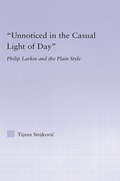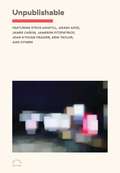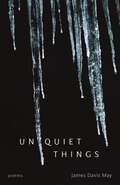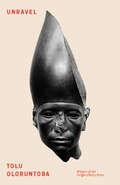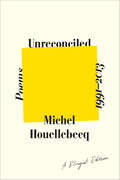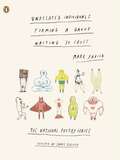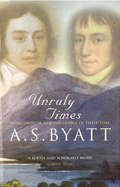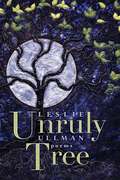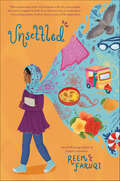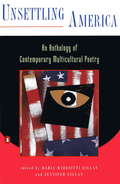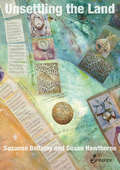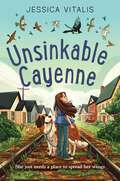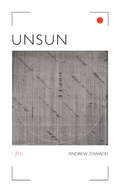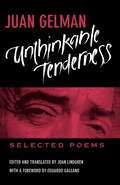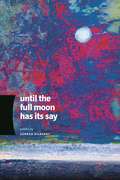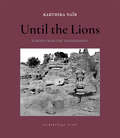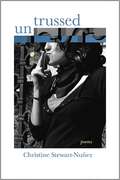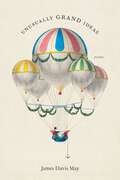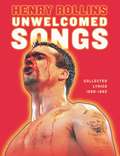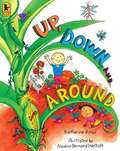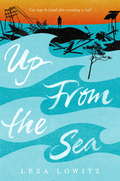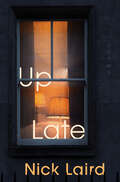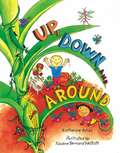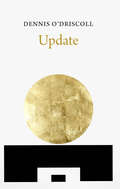- Table View
- List View
Unnoticed in the Casual Light of Day: Phillip Larkin and the Plain Style (Studies in Major Literary Authors)
by Tijana StojkovicLarkin's poems are often regarded as falling somewhere between the traditional 'plain' and the more contemporary 'postmodern' categories. This study undertakes a comprehensive linguistic and historical study of the plain style tradition in poetry, its relationship with so-called 'difficult' poetry, and its particular realization in the cultural and historical context of 20th-century Britain. The author examines the nature of poetry as a type of discourse, the elements of, and factors in, the development of literary styles, a close rhetorical examination of Larkin's poems within the described poetic frameworks, and his position in the British twentieth-century poetic canon.
Uno, Dos, Tres: One, Two, Three
by Pat Mora Barbara LavalleePictures depict two sisters going from shop to shop buying birthday presents for their mother. Rhyming text presents numbers from one to ten in English and Spanish. GLOSSARY.
Unpublishable
by Chris Molnar and Etan Nechin&“Being alive is just microdosing death.&” Collected works from the notorious Brooklyn reading series, from notable and emerging writers alike. A famed underground reading series at POWERHOUSE Arena in Brooklyn, organized by Chris Molnar and Etan Nechin, Unpublishable draws hundreds of devotees eager to hear from authors known and unknown as they share their most unusual, unexpected and unpublishable work. It is a home and meeting place for "writing that excites you, that scares you, things that you delete from your browser history. The piece you can't submit but can't stop thinking about either, burning a hole in the bottom of your desk drawer. Writing from any genre that is uncharacteristic, outré, or offending of sensibilities, that is impossible to place or be published in some fashion." Writers from a range of cliques and communities participate, giving striking and unusual performances. Each event includes a chapbook of pieces read, and this anthology collects them together for the first time. Unpublishable has now become Archways, an even more hotly attended reading series which is the lifeblood of this imprint, and the barrier-defying ethos it represents is a critical part of Archway Editions' DNA. Contributors include Mary Boo Anderson, Daphne Palasi Andreades, Steve Anwyll, Hratch Arbach, Arash Azizi, James Cañon, Nifath Karim Chowdhury, Jessica Denzer, Naomi Falk, John Farris, Jameson Fitzpatrick, Caitlin Forst, Jean Kyoung Frazier, Chris Gonzalez, Evan Gorzeman, Mina Hamedi, Brent Kite, Jason Koo, Noah LeBien, Anya Lewis-Meeks, Chris Molnar, Etan Nechin, Nicodemus Nicoludis, Kate Olsson, Erin Taylor, and Joanna C. Valente.
Unquiet Things: Poems (Goat Island Poetry)
by James Davis MayGrounded in wonder and fueled by an impulse to praise, the poems in James Davis May's debut collection, Unquiet Things, grapple with skepticism, violence, and death to generate lasting insights into the human experience. With compassion and humor, this second and final volume in Claudia Emerson's Goat Island Poets series exposes the unseen tragedies and rejoices in the small, surprising moments of grace in everyday life.May's poems impart sincere astonishment at the natural world, where experiences of nature serve as "stand-ins, almost, / for grace." His poems seek to transcend cynicism, turning often to the landscapes of North Georgia, his native Pittsburgh, and eastern Europe, as well as to his literary forebears, for guidance. For the poet, no force propels that transcendence more powerfully than love: love for his wife and daughter, love for language, and love for the incomprehensible world that he inhabits. These stylistically varied poems are by turns conversational, earnest, self-deprecating, meditative, and often funny, whether they're discussing grand themes such as love and beauty, or more corporeal subjects like fever and food poisoning.Lyrical and strange, tragic and amusing, Unquiet Things traces an experiential journey in the ordinary world, uncovering joys that span from the lingering memories of childhood to the losses and triumphs of adulthood.
Unravel: Poems
by Tolu Oloruntoba&“These are poems of deep thought, passionate engagement, and often searing images.&” —Toronto Star (on Each One a Furnace)A poetic exploration of the cyclical philosophy of dismantling and remaking, Unravel is a moving and inventive rove through what could happen in the deconstructed aftermath of person and world.
Unreconciled: Poems, 1991–2013: A Bilingual Edition
by Michel HouellebecqSelected poems from the critically acclaimed author of Submission and The Elementary ParticlesA shimmering selection of poems chosen from four collections of one of France’s most exciting authors, Unreconciled shines a fresh light on Michel Houellebecq and reveals the radical singularity of his work. Drawing on themes that are similar to the ones in his novels, these poems are a journey into the depths of individual experience and universal passions.Divided into five parts, Unreconciled forms a narrative of love, hopelessness, catastrophe, dedication, and—ultimately—redemption. In a world of supermarkets and public transportation, indifferent landscapes and lonely nights, Houellebecq manages to find traces of divine grace even as he exposes our inexorable decline into chaos.Told through forms and rhythms that are both ancient and new, with language steeped in the everyday, Unreconciled stands in the tradition of Baudelaire while making a bold new claim on contemporary verse. It reveals that in addition to his work as an incisive novelist, Houellebecq is one of our most perceptive poets with a vision of our era that brims with tensions that cannot—and will not—be reconciled.
Unrelated Individuals Forming a Group Waiting to Cross
by Mark YakichMark Yakich is an original... In the unabashedly unwieldy title and in each poem, there are no borders drawn between the commonplace and the metaphysical. There are journeys, crossings, and departures--all evocative of the loneliness, alienation, and desire for identity with another (person or place), which, formalized, makes this work recognizable as art of a very high order." --James Galvin, Guggenheim Foundation and National Endowment of the Arts Fellow
Unruly Times: Wordsworth and Coleridge in Their Time
by A S ByattUnruly Times is a superlative portrait of the relationship between Wordsworth and Coleridge, and a fascinating exploration of the Romantic Movement and the dramatic events that shaped it. With a novelist's insight and eye for detail, A. S. Byatt brings alive this tumultuous period and shows a deep understanding of the effects upon the minds of Wordsworth, Coleridge and their contemporaries - de Quincey, Lamb, Hazlitt, Byron and Keats.
Unruly Tree: Poems (Mary Burritt Christiansen Poetry Series)
by Leslie UllmanThe cryptic prompts—fragments, really—of Brian Eno&’s and Peter Schmidt&’s Oblique Strategies unveiled themselves to Leslie Ullman as rough translations from an obscure language. As an experiment, Ullman used each one as a poem title, and in doing so she accessed a thrill of freedom, uncertainty, and propulsion beyond her own familiar patterns and landscapes. In the process, she found herself exploring the literary, visual, and musical arts from angles that had never occurred to her before.Unruly Tree showcases the most successful of Ullman&’s play, and the result is a marvelous work by a poet at the height of her craft. At its heart this book is about process itself—even when it applies to experiences outside the arts—and about reclaiming an inner freedom many of us lose in our lives as adults in these noisy, rancorous times.
Unsettled
by Reem FaruqiA Bank Street Best Children’s Book of the Year · Kid's Indie Next List · Featured in Today Show’s AAPI Heritage Month list · A Kirkus Children's Best Book of 2021 · A National Council of Teachers of English Notable Verse Novel · Jane Addams 2022 Children’s Book Award Finalist · 2021 Nerdy Award Winner · Muslim Bookstagram Award Winner for Best Middle School BookFor fans of Other Words for Home and Front Desk, this powerful, charming immigration story follows a girl who moves from Karachi, Pakistan, to Peachtree City, Georgia, and must find her footing in a new world. Reem Faruqi is the ALA Notable author of award-winning Lailah's Lunchbox."A lyrical coming of age story exploring family, immigration, and most of all belonging.” —Aisha Saeed, New York Times bestselling author of Amal Unbound“This empowering story will resonate with people who have struggled to both fit in and stay true to themselves.” —Veera Hiranandani, Newbery Honor author of The Night Diary“A gorgeously written story, filled with warmth and depth." —Hena Khan, author of Amina’s VoiceWhen her family moves from Pakistan to Peachtree City, all Nurah wants is to blend in, yet she stands out for all the wrong reasons. Nurah’s accent, floral-print kurtas, and tea-colored skin make her feel excluded, until she meets Stahr at swimming tryouts.And in the water Nurah doesn’t want to blend in. She wants to win medals like her star athlete brother, Owais—who is going through struggles of his own in the U.S. Yet when sibling rivalry gets in the way, she makes a split-second decision of betrayal that changes their fates.Ultimately Nurah slowly gains confidence in the form of strong swimming arms, and also gains the courage to stand up to bullies, fight for what she believes in, and find her place.
Unsettling America: An Anthology of Contemporary Multicultural Poetry
by Jennifer Gillan Maria Mazziotti GillanA multicultural array of poets explore what it is means to be American This powerful and moving collection of poems stretches across the boundaries of skin color, language, ethnicity, and religion to give voice to the lives and experiences of ethnic Americans. With extraordinary honesty, dignity, and insight, these poems address common themes of assimilation, communication, and self-perception. In recording everyday life in our many American cultures, they displace the myths and stereotypes that pervade our culture.Unsettling America includes work by: Amiri BarakaChitra Banerjee DivakaruniRita DoveLouise ErdichJessica HagedornJoy HarjoGarrett HongoLi-Young LeePat MoraNaomi Shihab NyeMarye PercyIshmael ReedAlberto RiosNtozake ShangeGary SotoLawrence FerlinghettiNellie WongDavid HernandezMary TallMountain ...and many more.
Unsettling the Land
by Susan Hawthorne Suzanne BellamyUnsettling the Land is a relection on the plight of the land in drought-stricken times, conjuring through both text and illustration, the complex relationships that create and sustain our unique Australian landscape in all its majesty, tranquility, and its present suffering.
Unsinkable Cayenne
by Jessica Vitalis“Intensely readable.” —School Library Journal (starred review)When her unconventional parents finally agree to settle down in one place, twelve-year-old Cayenne’s dreams come true—but the reality of fitting in is much harder than she imagined. Acclaimed author Jessica Vitalis crafts an unforgettable historical novel-in-verse about belonging, family, and social class, for fans of Lisa Fipps’s Starfish and Jasmine Warga’s Other Words for Home.As Cayenne enters seventh grade, her parents decide it's time to stop living in their van, roaming from place to place. Cayenne hopes that this means she will finally belong somewhere and make some friends. But it turns out that staying in one place isn’t easy at all.When her social studies class studies the Titanic tragedy (the wreckage has just been discovered and her teacher is obsessed), Cayenne sees more and more parallels between the social strata of the infamous ship and her own life. Will she ever squeeze her way into the popular girls’ clique, even though they live in fancy houses on the hill and she lives in a tiny, rundown home with chickens in the front yard? Is it possible that the boy she likes actually likes her back? Can she find a way to make room for herself in this town? Does she really want to? Maybe being “normal” isn’t all it’s cracked up to be.Set in the mid-1980s, this literary novel is for readers of Megan E. Freeman’s Alone and Erin Entrada Kelly’s We Dream of Space.
Unsun
by Andrew ZawackiIn his fifth poetry volume, American poet Andrew Zawacki expands his inquiry into the possibilities and dangers of a ‘global pastoral,’ exploring geographies alternately enhanced and flattened out by digital networks, international transit, the uneven and invisible movements of capital, and the unrelenting feedback loops of data surveillance, weather disaster, war. <P><P>Wheeling interference patterns of systems of meaning, from radio signals and runway signage to foreign phrases and babytalk, interact with the ‘langscape’ of English, while punctuation is retrofitted as coding. In creating a politically committed lyric form that opens all the dimensions of language – sonic and semantic, syntactic and graphic – Unsun sustains an oblique conversation with Paul Celan’s Fadensonnen, Chris Marker’s Sans soleil, and Michael Palmer’s Sun. Loosely structured by the settings of analog photography, the book features a suite of the author’s black-and-white, large format images alongside an adaptation of Tang Dynasty poet Wang Wei and a series of fractured sonnets for – and from – his young daughter.
Unthinkable Tenderness: Selected Poems
by Juan GelmanJuan Gelman is Argentina's leading poet, but his work has been almost unknown in the United States until now. In 2000, he received the Juan Rulfo Award, one most important literary awards in the Spanish-speaking world, and in 2007, he received the Cervantes Prize, the Spanish-speaking world's top literary prize. With this selection, chosen and superbly translated by Joan Lindgren, Gelman's lush and visceral poetry comes alive for an English-speaking readership.Gelman is a stark witness to the brutality of power, and his poems reflect his suffering at the hands of the Argentine military government (his son, daughter-in-law, and grandchild were "disappeared"). While political idealism infuses his writing, he is not a servant of ideology. Themes of family, exile, the tango, Argentina, and Gelman's Jewish heritage resonate throughout his poems, works that celebrate life while confronting heartache and loss."remembering their little bones when it rains/ the compañerosstomp on darkness/set forth from death/wander the tender night/I hear their voices like living faces"—from Remembering Their Little Bones
Until the Full Moon Has Its Say: Until The Full Moon Has Its Say
by Conrad HilberryThe poems in Until the Full Moon Has Its Say were inspired by the loss of poet Conrad Hilberry's wife of fifty-six years, Marion. While the poems in this volume delve into the initial emptiness and hopelessness of grieving, the poet's connections to the natural world, music, and other people ultimately bring him back into the present while still acknowledging and honoring the past. The work of a skilled poet with a lifetime of experience, this collection displays Hilberry's mastery of form. The book's three sections include a sonnet, five villanelles, and a variety of stanza structures, all written in his signature tone, which is contemplative, tender, and moving. The elegant poems of Until the Full Moon Has Its Say arise from the consideration of ordinary, even humble, subjects--a bowl on a table, a blackout, mosquitoes, garlic mustard, algae on the local pond. Hilberry's relaxed voice is wise and measured even in the depths of grief, as he muses, "How can I draw dead branches / in a poem?" Part of the answer to that question lies in the use of form, which gives shape to experience. In his formal virtuosity, Hilberry even writes a villanelle--a notoriously difficult poetic form--about writing a villanelle. Written by the poet in his eighties, Until the Full Moon Has Its Say is a powerful reflection on mortality and on the art that has been his lifelong practice. All readers of poetry will treasure this powerful volume.
Until the Lions: Echoes from the Mahabharata
by Karthika NairA dazzling and eloquent reworking of the Mahabharata, one of South Asia's best-loved epics, through nineteen peripheral voices. With daring poetic forms, Karthika Naïr breathes new life into this ancient epic.Karthika Naïr refracts the epic Mahabharata through the voices of nameless soldiers, outcast warriors and handmaidens as well as abducted princesses, tribal queens, and a gender-shifting god. As peripheral figures and silent catalysts take center stage, we get a glimpse of lives and stories buried beneath the dramas of god and nation, heroics and victory - of the lives obscured by myth and history, all too often interchangeable. Until the Lions is a kaleidoscopic, poetic tour de force. It reveals the most intimate threads of desire, greed, and sacrifice in this foundational epic.
Untrussed: Poems (Mary Burritt Christiansen Poetry Series)
by Christine Stewart-NuñezStewart-Nuñez draws upon a number of styles—persona, ekphrastic, lyrical, formal—to create a collection that explores the promises of love and loss. Among Untrussed&’s many delights is a series of Wonder Woman poems that reveal a heroine who is as human as she is superhuman. From pleasure to pain to hope of new love, this collection draws readers into the everyday magic of the world.
Unusually Grand Ideas: Poems
by James Davis MayTitled after one of the side effects of antidepressants, Unusually Grand Ideas is a poignant account of clinical depression and the complications it introduces to marriage and fatherhood. James Davis May’s poems describe mental illness with nuance, giving a full account of the darkness but also the flashes of hope, love, and even humor that lead toward healing. In pieces ranging from spare lyrical depictions of pain to discursive meditations that argue for hope, May searches for meaning by asking the difficult but important questions that both trouble and sustain us.
Unwelcomed Songs
by Henry RollinsUnwelcomed Songs (Collected Lyrics 1980-1992) is by Henry Rollins, the former lead vocalist of the seminal LA band Black Flag and current leader of the Rollins Band. Henry Rollins has been writing and releasing songs for over twenty years. This is the first time ever that a collection of his lyrics will be published. (He doesn't even print lyrics in his album liner notes!) Unwelcomed Songs will contain lyrics to all the songs on Rollins' records, soundtracks and compilations in addition to several lyrics never before released. Also included will be alternate version of lyrics and reproductions of selected handwritten originals. Alongside many of the printed lyrics will be working notes for many of the songs and notes describing the recording sessions of several of his albums. Fans will also love seeing the over 200 b/w photos included in this book. Most of these photos have never been seen before and were culled from the author's personal archives. This book will be a must have for every Henry Rollins fan.
Up Down and Around (Fountas & Pinnell LLI Blue #Level H)
by Katherine AyresA garden produces a variety of edible plants, such as corn that grows up, onions that grow down, and tomato vines that twine all around.
Up From the Sea
by Leza LowitzA powerful novel-in-verse about how one teen boy survives the March 2011 tsunami that devastates his coastal Japanese village. <P><P>On that fateful day, Kai loses nearly everyone and everything he cares about. When he's offered a trip to New York to meet kids whose lives were changed by 9/11, Kai realizes he also has a chance to look for his estranged American father. <P><P>Visiting Ground Zero on its tenth anniversary, Kai learns that the only way to make something good come out of the disaster back home is to return there and help rebuild his town. Heartrending yet hopeful, Up from the Sea is a story about loss, survival, and starting anew. <P><P>Fans of Jame Richards's Three Rivers Rising and teens who read Karen Hesse's Out of the Dust as middle graders will embrace this moving story. An author's note includes numerous sources detailing actual events portrayed in the story.
Up Late: Poems
by Nick LairdAcclaimed poet Nick Laird reflects on the strange and chaotic times we live in with singular precision, clarity, and daring. Reeling in the face of collapsing systems, of politics, identity, and the banalities and distortions of modern living, Nick Laird confronts age-old anxieties, questions of aloneness, friendship, the push and pull of daily life. These poems transport us from a clifftop in Ireland’s County Cork to a bench in New York’s Washington Square, from a face-off between Freud and Michelangelo’s Moses to one between the poet and a squirrel in a London garden. At the book’s heart lies the Forward Prize–winning title sequence, a profound meditation on a father’s dying at the height of the Covid-19 pandemic. The reverberations of this knockout poem echo through the volume in its interrogations of inheritance and legacy, illness and justice, accounts of what is lost and what, if anything, can be retained. Amid rage, grief, and the conflagration of reality, Laird finds tenderness in the moments of connection that grow between the cracks and offers glimpses into the unadulterated world of childhood, where everything is still at stake and infinite. Astonishing in its emotional range and intellect, Up Late is a powerful volume from an “exceptionally gifted poet” (Paul Muldoon, Times Literary Supplement).
Up, Down, and Around
by Katherine AyresThis garden is on the move! A good-time, rollicking celebration of things that grow. PEPPERS GROW UP. POTATOES GROW DOWN. PUMPKINS VINE AROUND AND AROUND. From seeds dropping into soil to corn bursting from its stalks, from children chasing butterflies to ants burrowing underground, everything in this vibrant picture book pulses with life -- in all directions! Sprightly illustrations set the mood for a rhythmic text that follows nature's course to a final feast of backyard bounty.
Update
by Dennis O'Driscoll"O'Driscoll is a quietly exciting, subtly intelligent poet."-Poetry London"O'Driscoll's crisp, unobtrusively musical precision gets to the heart of so many subjects, large and small."-The Guardian"O'Driscoll is a real poet: his lines stay with you, and crop up unbidden in your mind as you go about your day."-Poetry Ireland ReviewUpdate, the final collection of work by the late Dennis O'Driscoll, weaves a memoir of his past into the state of the world today. The poems embark on a vivid journey through consumerism, our environment, and our fragile existence. Update is O'Driscoll's parting gift, granting a shimmering glimpse of what it truly means to be human.Ticking the BoxesTick the relevant boxesin this census form tonightif you are still in the landof the living at that time.You must remainin suspense until then.You have all morning still.You have all afternoon long.One continuous hour.A whole six minutes.Twenty-eight precious seconds left.Three.Two.One.In which to lose your job.Your citizenship.Your house.Your spouse.Your child.Your mind.Your sight.Your faith.Your life.Count on absolutely nothing yet.Dennis O'Driscoll (1954-2012), editor of Poetry Ireland Review, was the author of ten collections of poetry as well as book of interviews with Seamus Heaney, Stepping Stones. Poetry Review called O'Driscoll "one of the best-read men in the Western world."
